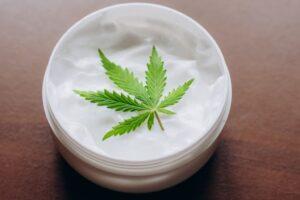The findings of a new study “indicate that CBD might be beneficial in alleviating UVB-induced skin damage in humans.”
 The study was published in the peer-reviewed journal Molecules, and was epublished by the U.S. National Institute of Health. It was conducted by researchers at Sichuan University in China.
The study was published in the peer-reviewed journal Molecules, and was epublished by the U.S. National Institute of Health. It was conducted by researchers at Sichuan University in China.
“Cannabidiol (CBD) has emerged as a phytocannabinoid with various beneficial effects for the skin, including anti-photoaging effects, but its mechanisms of action are not fully elucidated”, states the study’s abstract. “The study assessed CBD’s photoprotective effects against acute ultraviolet B (UVB)-induced damage in HaCaT human keratinocyte cells and murine skin tissue.”
Researchers found that “CBD (8 μM) alleviated UVB-induced cytotoxicity, apoptosis, and G2/M cell cycle arrest in HaCaT cells.”
In addition, “The contents of γH2AX and cyclobutane pyrimidine dimers were decreased after CBD treatment”, and “CBD reduced the production of reactive oxygen species and modulated the expression of antioxidant-related proteins such as nuclear factor erythroid 2-related factor 2 in UVB-stimulated HaCaT cells.”
Furthermore, “CBD mitigated the UVB-induced cytotoxicity by activating autophagy. In addition, a cream containing 5% CBD showed effectiveness against UVB-induced photodamage in a murine model.
The study states that “CBD cream improved the skin’s condition by lowering the photodamage scores, reducing abnormal skin proliferation, and decreasing expression of the inflammation-related protein cyclooxygenase-2 in UVB-irradiated skin tissue.”
In conclusion, researchers state that “These findings indicate that CBD might be beneficial in alleviating UVB-induced skin damage in humans. The photoprotective effects of CBD might be attributed to its modulatory effects on redox homeostasis and autophagy.”
For further info on this study, click here. The study’s full abstract can be found below:
Abstract
Cannabidiol (CBD) has emerged as a phytocannabinoid with various beneficial effects for the skin, including anti-photoaging effects, but its mechanisms of action are not fully elucidated. The study assessed CBD’s photoprotective effects against acute ultraviolet B (UVB)-induced damage in HaCaT human keratinocyte cells and murine skin tissue. CBD (8 μM) alleviated UVB-induced cytotoxicity, apoptosis, and G2/M cell cycle arrest in HaCaT cells. The contents of γH2AX and cyclobutane pyrimidine dimers were decreased after CBD treatment. CBD reduced the production of reactive oxygen species and modulated the expression of antioxidant-related proteins such as nuclear factor erythroid 2-related factor 2 in UVB-stimulated HaCaT cells. Furthermore, CBD mitigated the UVB-induced cytotoxicity by activating autophagy. In addition, a cream containing 5% CBD showed effectiveness against UVB-induced photodamage in a murine model. The CBD cream improved the skin’s condition by lowering the photodamage scores, reducing abnormal skin proliferation, and decreasing expression of the inflammation-related protein cyclooxygenase-2 in UVB-irradiated skin tissue. These findings indicate that CBD might be beneficial in alleviating UVB-induced skin damage in humans. The photoprotective effects of CBD might be attributed to its modulatory effects on redox homeostasis and autophagy.






